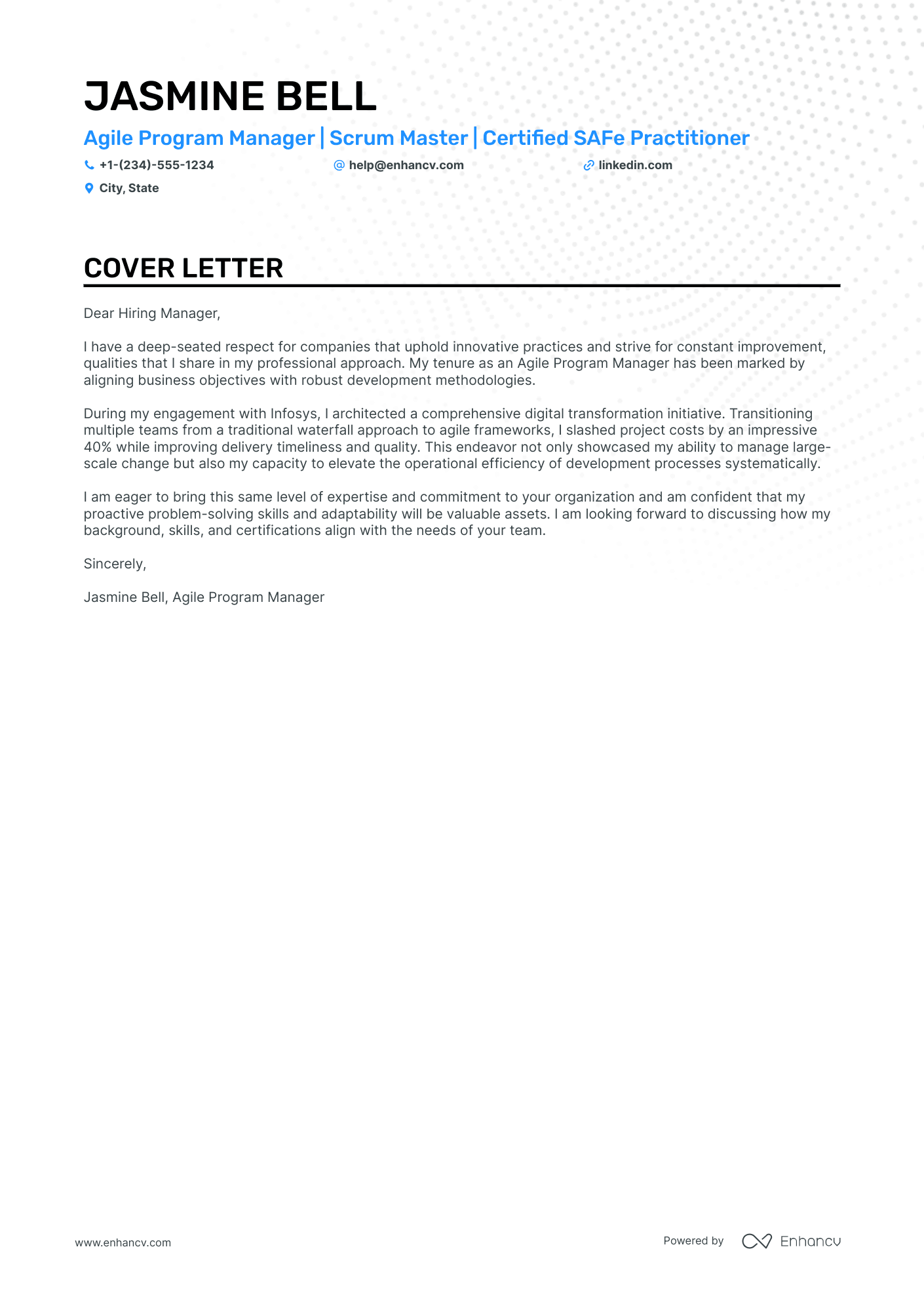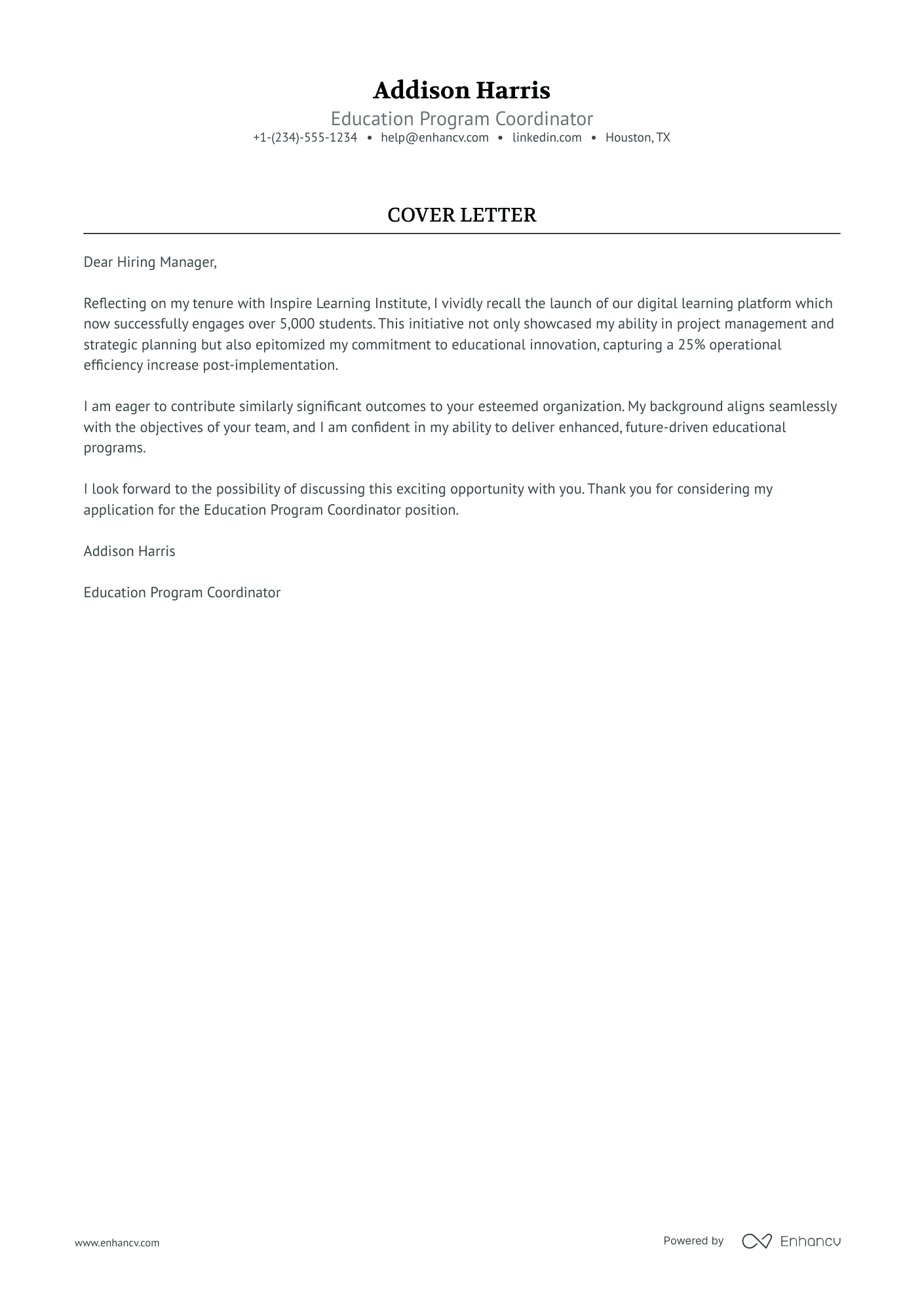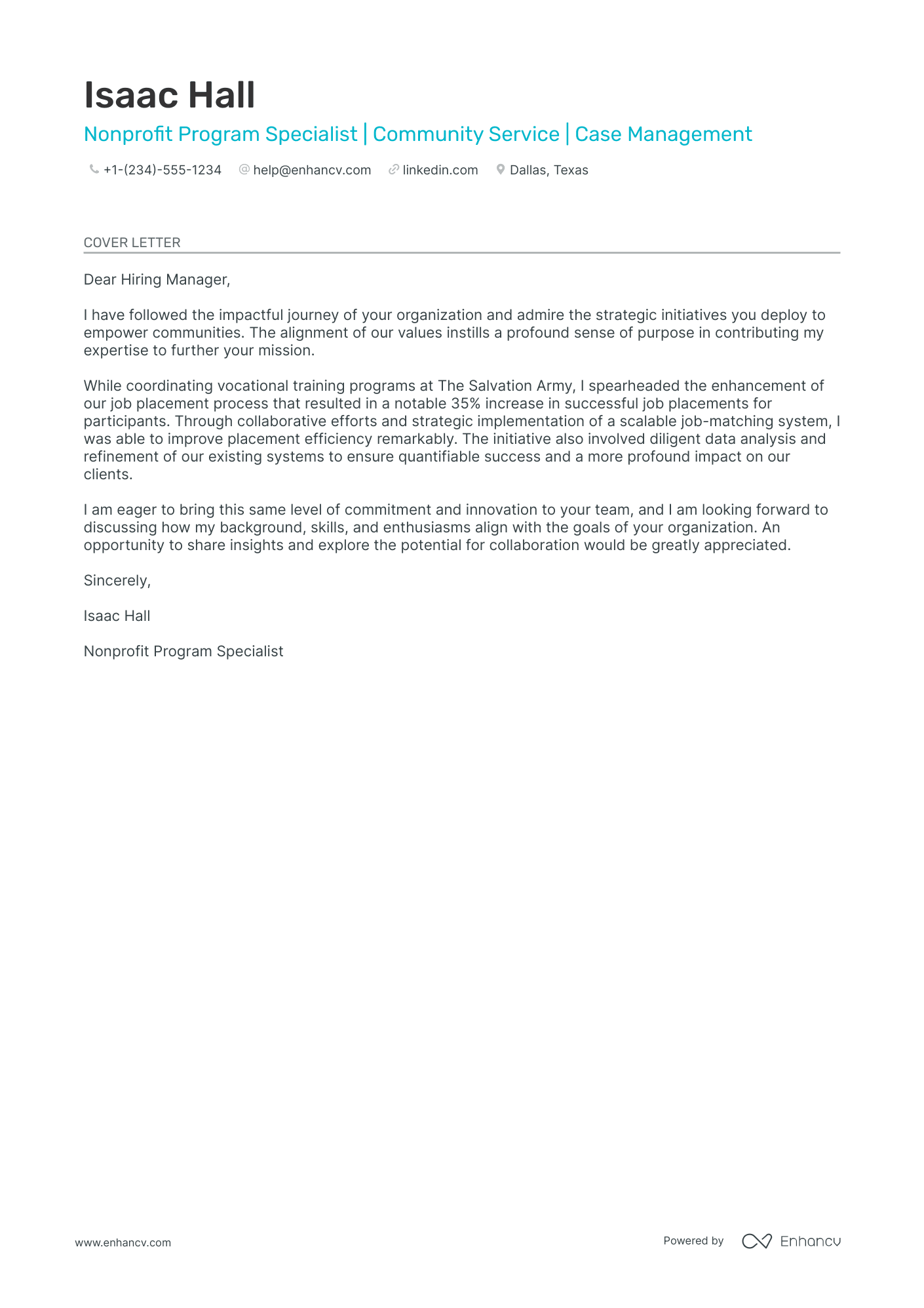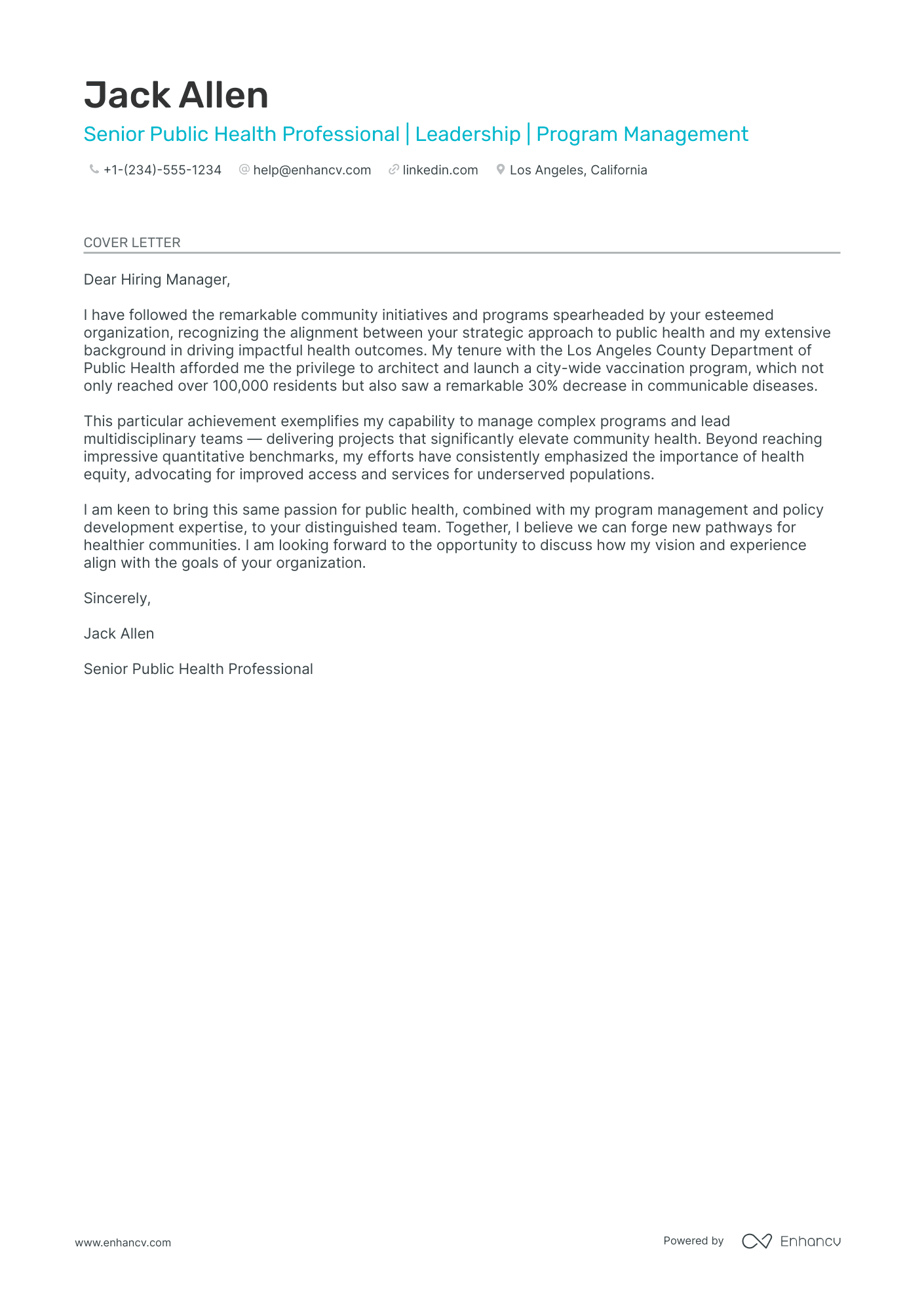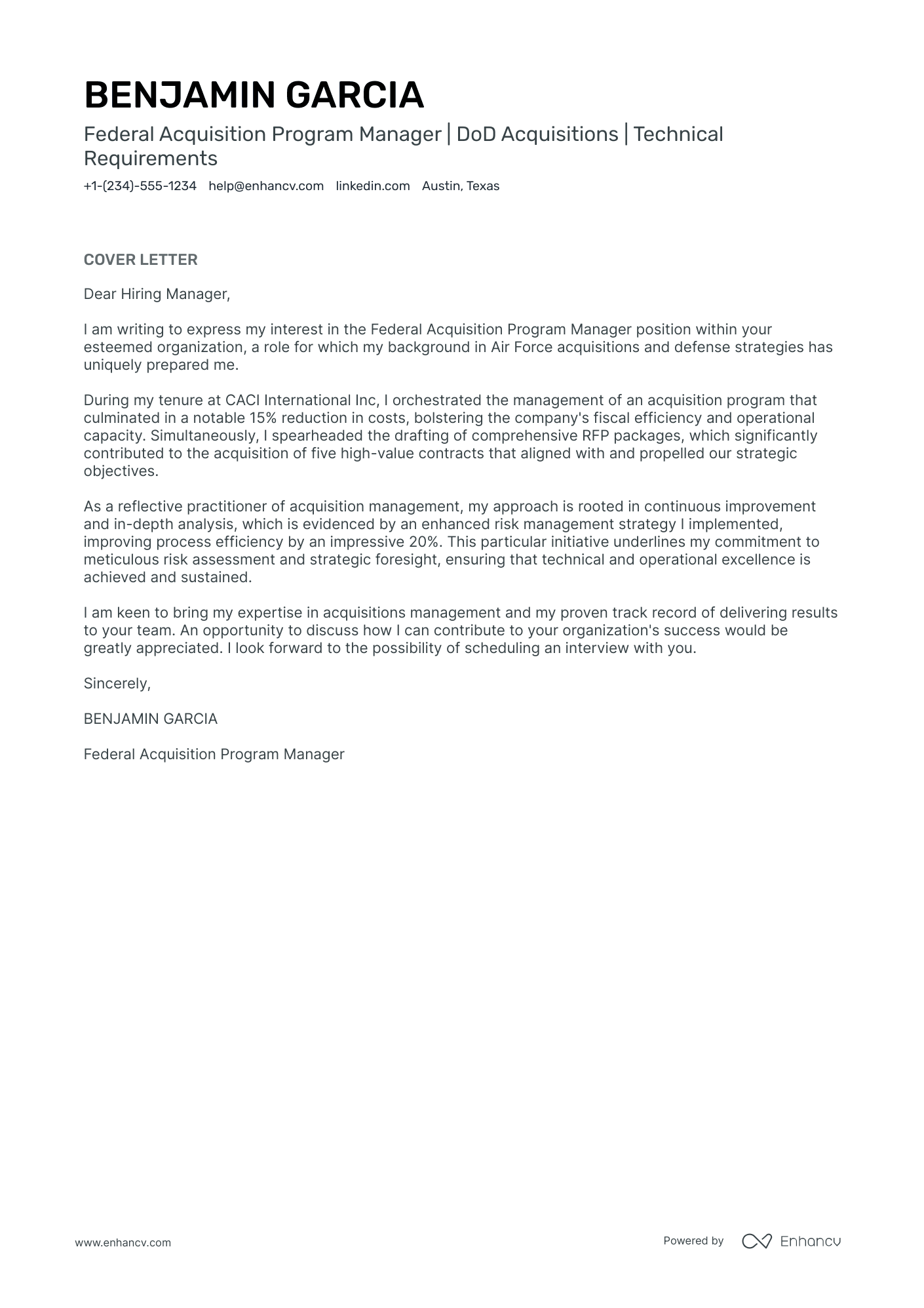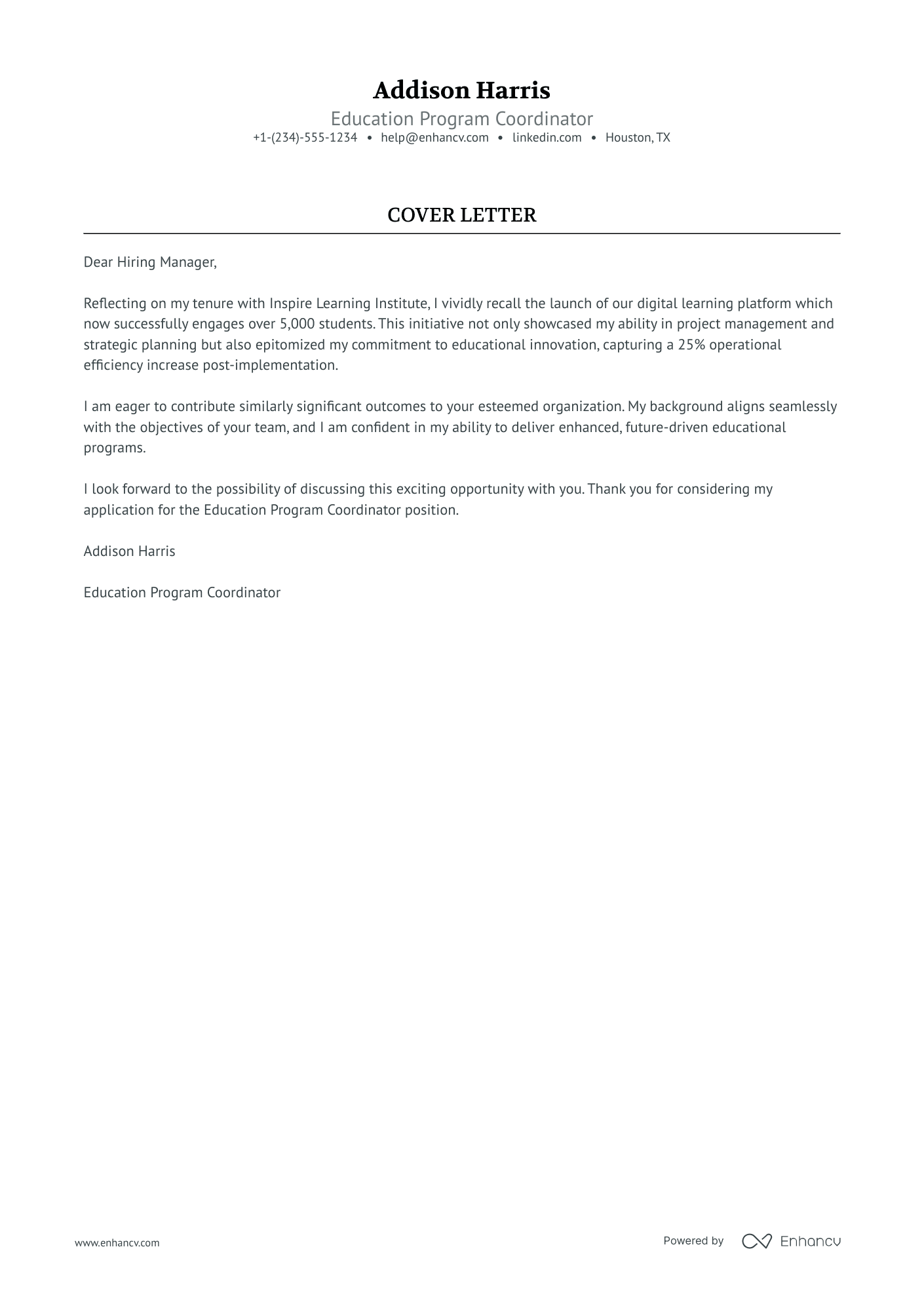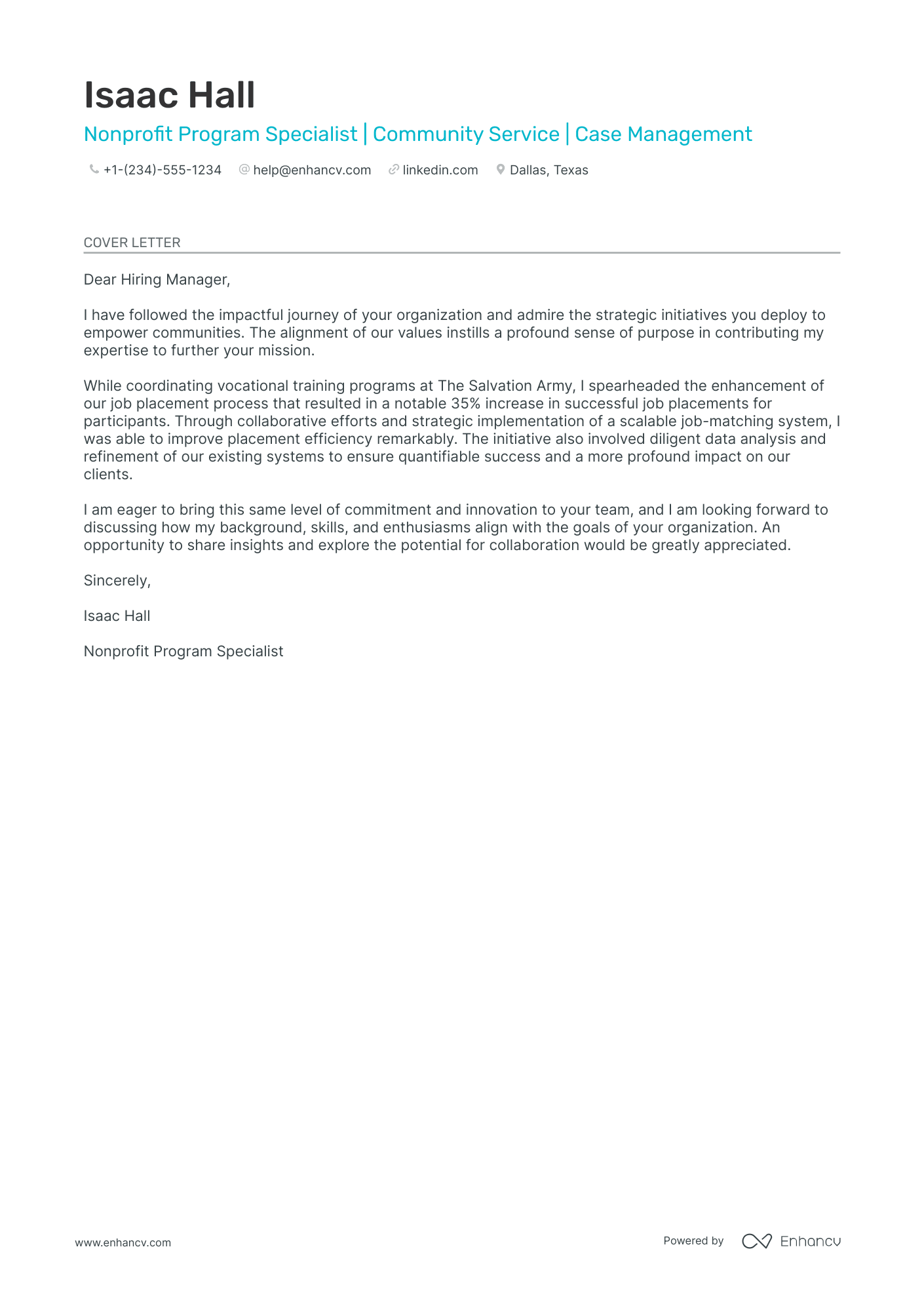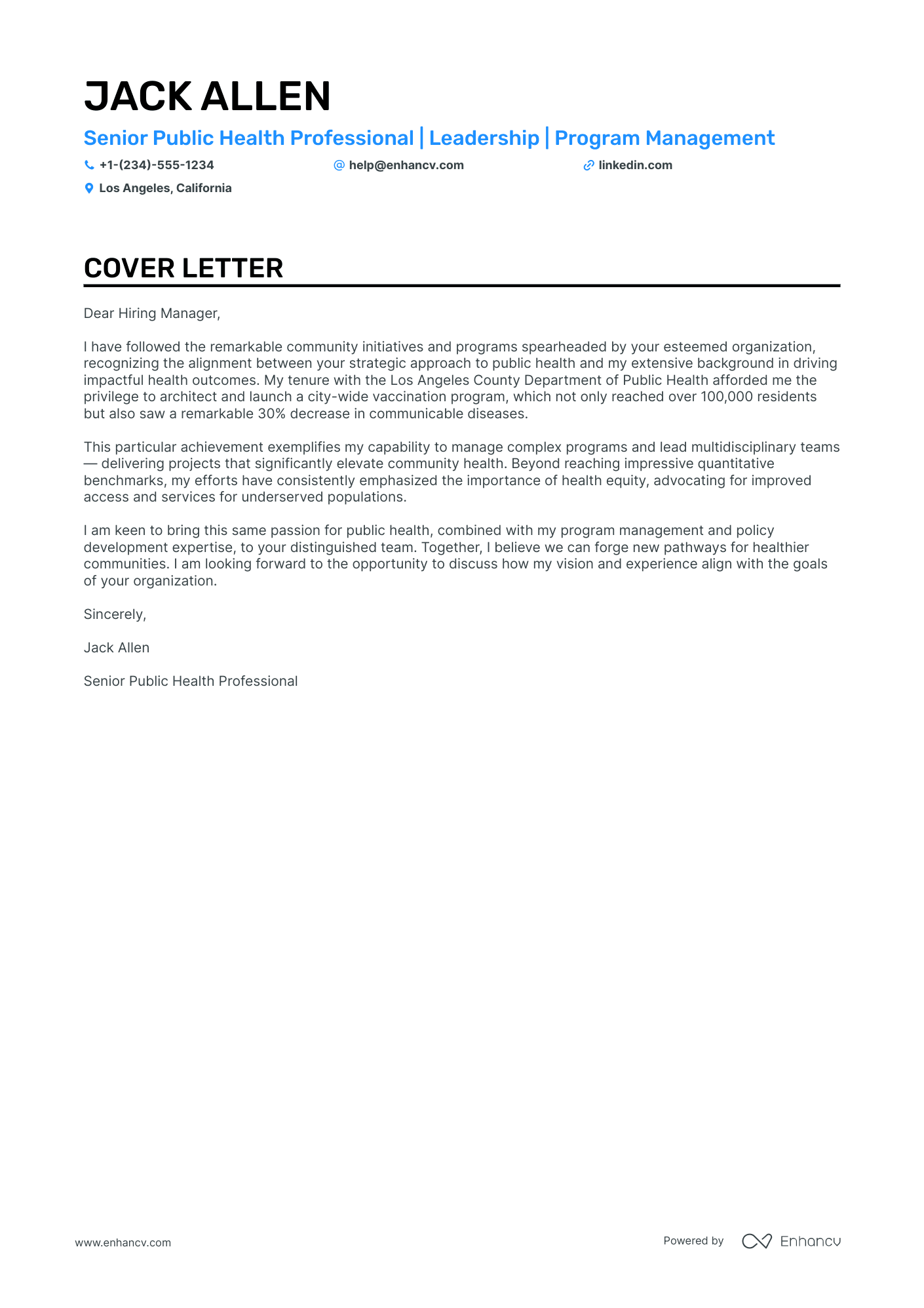Writing a program manager cover letter can be daunting, especially when you realize it's a required step after you've started your job search. It's not a retelling of your resume; this is your chance to highlight a significant professional triumph, to tell the story behind your proudest moment. Striking a balance between formality and fresh, authentic expression can be tricky—aim for a compelling narrative free of clichés and remember to keep it concise, under one page. Let's get you started.
- Personalize the greeting to address the recruiter and your introduction that fits the role;
- Follow good examples for individual roles and industries from job-winning cover letters;
- Decide on your most noteworthy achievement to stand out;
- Format, download, and submit your program manager cover letter, following the best HR practices.
Use the power of Enhancv's AI: drag and drop your program manager resume, which will swiftly be converted into your job-winning cover letter.
If the program manager isn't exactly the one you're looking for we have a plethora of cover letter examples for jobs like this one:
Drop your resume here or choose a file.
PDF & DOCX only. Max 2MB file size.
Program manager cover letter example
Taylor Foster
San Francisco, CA
+1-(234)-555-1234
help@enhancv.com
- Quantifying achievements in past roles, such as accelerating data processing speeds by 40%, managing a $5M budget, and increasing team productivity by 35%, effectively showcases the candidate's impact and competence.
- Emphasizing relevant experience, such as leading API integration projects, highlights the candidate's expertise and suitability for a technical program management role within a tech organization.
- Expressing alignment with the company's vision and demonstrating enthusiasm for contributing to its success helps establish a cultural fit and showcases the candidate's motivation for applying to the organization.
- Mentioning the management of resources and successful cost reductions while delivering high-quality outcomes reflects the candidate's strong strategic planning and financial stewardship skills, crucial for a senior technical program management position.
The format of your program manager cover letter: structure, fonts, margins, and more
Your program manager cover letter should include a header (with your name, position, and date); a greeting and introductory paragraph; a body and closing paragraphs; and an optional signature.
Remember that you're writing your program manager cover letter for recruiters - as the Applicant Tracker System won't scan this content.
Here are a few more tips and tricks to keep in mind when formatting your program manager cover letter:
- Use the same font in your program manager cover letter and resume. We recommend modern fonts, e.g. Lato and Rubik, to help you stand out, instead of the stereotypical Arial and Times New Roman.
- Each paragraph should have single spacing, which is already set up for you in our cover letter templates.
- Our cover letter builder follows industry standards for your program manager cover letter formatting - with a one-inch margin, surrounding your content.
- Always export your program manager cover letter in PDF to ensure the image or text quality stays the same and your writing isn't moved about.
Skip the hassle of writing a cover letter. Use our free cover letter generator and get it done in moments.
The top sections on a program manager cover letter
- Header with Contact Information: Include your name, address, phone number, and email to ensure the recruiter can easily reach out to you for further conversation about the program management position.
- Greeting with Recipient's Name: Address the hiring manager or recruiter directly (if possible, find out their name) to establish a personal connection and demonstrate your attention to detail.
- Introduction with Mention of Program Management Expertise: Begin with a concise opening that highlights your experience in program management, tailored to the specifics of the job description, to immediately establish your relevance for the role.
- Body Highlighting Program Management Successes: Use bullet points or short paragraphs to elaborate on your experience in leading cross-functional teams, managing budgets, and successfully driving programs to completion, providing specific examples and outcomes.
- Closing with Call to Action for Program Management Dialogue: Conclude by expressing your eagerness to discuss how your program management skills align with the company's goals, and initiate the next step by suggesting a meeting or further discussion.
Key qualities recruiters search for in a candidate’s cover letter
Proven experience in program management: Recruiters look for candidates who have successfully managed programs from inception to completion, showcasing their ability to plan, execute, and deliver complex projects.
Strong leadership and team management skills: A program manager must effectively lead multidisciplinary teams and ensure cooperation and productivity, which requires strong interpersonal skills and the ability to motivate others.
Strategic thinking and vision: Recruiters prioritize candidates who can align programs with organizational goals, anticipate challenges, and develop long-term strategies to achieve success.
Budgeting and financial acumen: Program managers need to be adept at creating and managing budgets, optimizing resources, and ensuring programs are financially viable.
Excellent communication and stakeholder management abilities: Clear communication with stakeholders, sponsors, and team members is essential for program success. Recruiters look for candidates who can articulate complex ideas and manage expectations.
Risk management and problem-solving proficiency: The capacity to identify potential risks, develop mitigation strategies, and address issues proactively is critical for a program manager to minimize impacts on the program's outcomes.
How to address hiring managers in your program manager cover letter greeting
Goodbye, "Dear Sir/Madam" or "To whom it may concern!"
The salutation of your program manager cover letter is how you kick off your professional communication with the hiring managers.
And you want it to start off a bit more personalized and tailored, to catch the recruiters' attention.
Take the time to find out who's recruiting for the role (via LinkedIn or the company page).
If you have previously chatted or emailed the hiring managers, address them on a first or last name basis.
The alternative is a "Dear HR team" or "Dear Hiring Manger", but remember that a "Dear Ms. Simmons" or "Dear Simon," could get you farther ahead than an impersonal greeting.
List of salutations you can use
- Dear Hiring Manager,
- Dear [Company Name] Team,
- Dear [Department Name] Director,
- Dear [Mr./Ms./Dr. Last Name],
- Dear Project Management Leader,
- Dear Selection Committee,
Your program manager cover letter introduction and the value you bring
Moving on from the "Dear Recruiter" to your professional introduction.
Use those first two sentences of your program manager cover letter to present the biggest asset you'd bring to the organization.
Don't go into too much detail about your achievement or the skill set, but instead - go straight for the win.
That is - what is your value as a professional?
Would you be able to build stronger, professional relationships in any type of communication? Or, potentially, integrate seamlessly into the team?
How to select your best achievement for the middle, or the program manager cover letter body
You probably feel exhausted by this point in your application: you've dived into all the details of your success and skills in your program manager resume.
What else can you include in your program manager cover letter body?
Well, for starters, the next three to six paragraphs should show you further value as a professional. Or, why should recruiters choose you?
Think back on a noteworthy achievement that answers key job requirements and dive deep.
Structure your program manager cover letter middle as you'd a story: following chronological logic and highlighting outcomes, thanks to skills.
At the end of the day, you'd want recruiters to be able to see you as the best candidate for the role and understand more about who you are and what makes your success unique (and valuable to the role).
Closing paragraph basics: choose between a promise and a call to action
You've done all the hard work - congratulations! You've almost reached the end of your program manager cover letter.
But how do you ensure recruiters, who have read your application this far, remember you?
Most program manager professionals end their cover letter with a promise - hinting at their potential and what they plan on achieving if they're hired.
Another option would be to include a call for follow-up, where you remind recruiters that you're very interested in the opportunity (and look forward to hearing from them, soon).
Choose to close your program manager cover letter in the way that best fits your personality.
Is it beneficial to mention that you have no experience in your program manager cover letter?
Lacking professional experience isn't the end of the world for your program manager cover letter.
Just be honest that you may not have had roles in the industry, but bring about so much more.
Like, your transferable skills, attained thanks to your whole work and life experience (e.g. the skills your summer spent working abroad taught you).
Or, focus on what makes you, you, and that one past success that can help you stand out and impress recruiters (think of awards you've attained and how they've helped you become a better professional).
Alternatively, write about your passion and drive to land the job and the unique skill set you would bring to enhance the workplace culture.
Key takeaways
Writing your program manager cover letter doesn't need to turn into an endless quest, but instead:
- Create an individual program manager cover letter for each role you apply to, based on job criteria (use our builder to transform your resume into a cover letter, which you could edit to match the job);
- Stick with the same font you've used in your resume (e.g. Raleway) and ensure your program manager cover letter is single-spaced and has a one-inch margin all around;
- Introduce your enthusiasm for the role or the company at the beginning of your program manager cover letter to make a good first impression;
- Align what matters most to the company by selecting just one achievement from your experience, that has taught you valuable skills and knowledge for the job;
- End your program manager cover letter like any good story - with a promise for greatness or follow-up for an interview.
Program Manager cover letter examples
By Role
